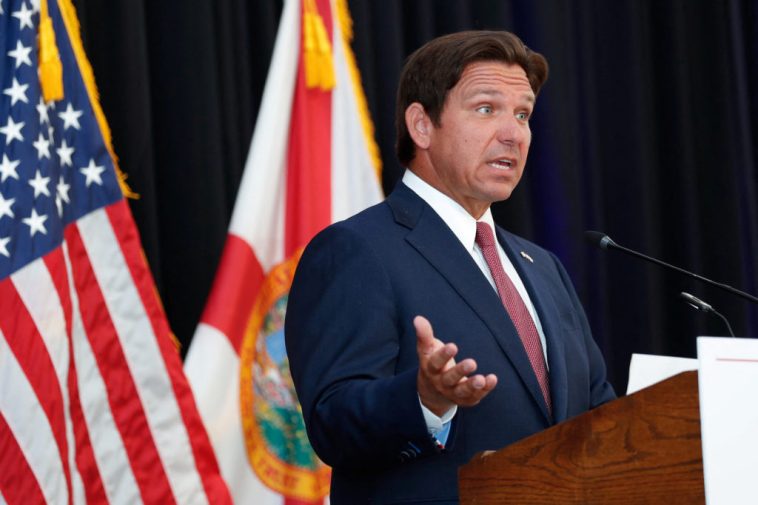In a recent episode of ‘Sunday Morning Futures’, an influential television show on Fox News, Florida Governor Ron DeSantis shared his views and actions toward fortifying election transparency. Over the past weekend, the governor discussed plans for Florida to have the most stringent and secure elections across the nation this fall. Developing trust within the electoral system is a cornerstone of democracy. Governor DeSantis went in-depth into the strategies Florida is using to make this happen.
A major step DeSantis highlighted was the prohibition of ballot harvesting. This activity, deemed by many as potentially compromising the purity of the freedom to vote, is now against the state’s laws. As such, Florida has gone further in laying down serious consequences for those who dare contravene these regulations. This is a significant stride in maintaining fair and just electoral processes.
Another key dimension Governor DeSantis emphasized is the necessity for voters to provide a photo ID to exercise their right to vote in Florida. “In our state, providing a photo ID is a requisite for casting your vote,” he confirmed. By prioritizing the establishment of secure voter identification measures, Florida is bolstering the integrity and reliability of its elections.
The Governor also revealed the ongoing efforts to actively supervise the state’s voter registration lists to maintain its accuracy, demonstrating the administration’s commitment to precise documentation. Through vigilant policing of the voter rolls, the assurance of a true reflection of eligible voters is enhanced, thereby safeguarding the state’s electoral process.
According to DeSantis, recurrent transgressors of electoral laws were being seriously dealt with. Thanks to a special task force developed for these cases. The so-called ‘election crimes unit’ was formed with the sole intention of probing, apprehending, and referring such individuals for prosecution.
The governor shared the result of this stringent watchdog approach: in the recent years, Florida has witnessed over 50 convictions of different sorts linked to election fraud. The effectiveness of the state’s prosecution machinery becomes evident in these circumstances and serves as a deterrent for people aiming to tamper with the integrity of the voting system.
Indeed, the requirement of voter ID in Florida is significant, as echoed by DeSantis. But in addition to the requirement itself, there are restrictions as to what can be accepted as a proof of identity. It states explicitly that illegal immigrants cannot be issued any form of photo ID.
In Florida, the issuance of photo IDs, including driver’s licenses or local government IDs by private entities or even local government agencies to undocumented immigrants, is strictly prohibited. According to Governor DeSantis, there exists no recognition for out-of-state licenses or any other forms of ID issued to illegal aliens.
What this effectively translates to is that it nearly eliminates the possibility for an unauthorized immigrant to register to vote. Certain states may allow the issuance of such IDs, creating opportunities for non-citizens to vote. However, under the jurisdiction of Governor DeSantis, the state of Florida is not one of them.
Florida’s system of voter ID requirements aims at implementing stringent checks to confirm the nationality of voters. The administration believes this to be fundamental in upholding the basic tenets of American democracy. Therefore, any and all attempts to ensure the voter lists comprise only of US citizens is pursued with unmatched vigour.
Accounts of unidentified non-citizens that got through the system and voted were referred to by the Governor. In these cases, the administration did not hesitate to act. DeSantis revealed that the state of Florida had initiated formal legal action against these offenders, thus emphasizing their commitment to election law enforcement.
One of the more contentious points DeSantis disclosed was the apparent opposition of the Democrats to the voter ID requirement. He was forthright in his contention that their opposition could be seen as an attempt to allow illegal votes into the system. Such stern views formed a potent topic in his conversation.
In the Governor’s view, there seemed to be no reasons other than skewing the vote counts that could justify the Democrats’ stance on voter ID laws. The debate on this topic is ongoing and it strongly reflects the ideological differences between the parties involved.
In conversation with Maria Bartiromo, Governor DeSantis laid bare his commitment to ensuring transparency and fairness in the electoral process. Through meticulous policing of the voter rolls, rigorous voter identification measures, and significant measures against illegal votes, Florida aims to uphold the integrity of its election system, perhaps even making it as secure and transparent as any in the nation.
This morning I joined Maria Bartiromo on Sunday Morning Futures to discuss Florida’s election integrity efforts. pic.twitter.com/Fc8bK289Pc
— Ron DeSantis (@GovRonDeSantis) September 15, 2024


